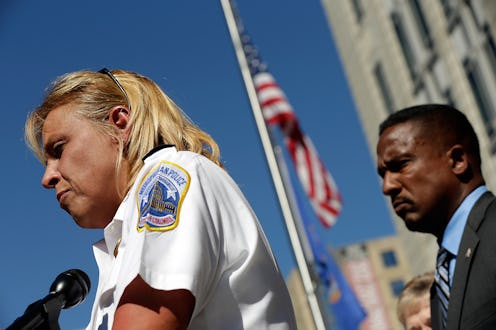News
The Warning Signs, More Navy Yard Shooting Details
Official investigations into the Navy Yard shooting are beginning to wrap up: The FBI confirmed yesterday that 34-year-old Aaron Alexis, shot dead by police at the scene, was the sole suspect in the mass shooting Monday that killed 12. According to surveillance footage, it’s now believed he brought a disassembled gun concealed in a bag into a bathroom in Building 197 before opening fire in the atrium.
Other details have emerged about the shooter, a Navy veteran who, it's becoming increasingly clear, left a trail of warning signs. Alexis had told police he heard voices, was described as “estranged from his family” and as one who “held onto grudges” by friends and ex-colleagues. He had also previously been treated by the Veterans Administration for mental health issues, yet hadn't been stripped of his security clearance.
Tragically, a recent audit by the U.S. Department of Defense also reveals that Navy Yard’s security wasn’t up to par at the time of the shooting, thanks to Naval budget cuts. A soldier at the Marine Barracks on the grounds told his father yesterday "We were trained, and if we had the ammunition, we could've cleared that building.' Only three people had been shot at that time, and they could've stopped the rest of it."
Also confirmed last night was that Alexis purchased his shotgun legally at a small store in Virginia, and that he’d passed all background checks prior to purchase, despite his mental health issues. This revelation has added momentum to the national debate about gun rights, and advocates for stricter control are once again hopeful for new laws after a related initiative earlier this year failed to gain ground.
A friend who Alexis stayed with in Thailand last year told NBC that Alexis was crazy “in a positive way, like funny” and that he exhibited no signs of mental illness she picked up on. “So I can’t really believe how he can shoot those people,” she said in Thai. “He looked kind of like, you know, bonkers, crazy, in a positive way, like funny, but, so I really can’t believe this.”
Alexis' mother issued a brief statement Wednesday, saying her son's "actions have had a profound and everlasting effect on the families of the victims...I don’t know why he did what he did, and I’ll never be able to ask him why. Aaron is now in a place where he can no longer do harm to anyone, and for that I am glad.”
Today, residents of communities where mass shootings have taken place are lobbying Congress for policy reform. Members of the Newtown (Conn.) Action Alliance gun law advocacy group had the trip planned previously to mark the nine-month anniversary of the shooting in Newtown that killed 20 children and six educators.
But in the wake of the Navy Yard shootings, they've been joined by residents of Aurora, Co., where a movie theatre shooting killed 12 and wounded 70 in July 2012, as well as by Amardeep Kaleka, the son of one of the victims of the Wisconsin Sikh temple shooting that killed six in August last year. He fears that populist opposition to gun control is overshadowed by big lobbyists who are permanent fixtures on Capitol Hill.
"The NRA is able to lobby [Congress] eight hours a day, five days a week, for months on end. We survivors come in periodically, only one or two times a year," he told the Associated Press.
Adding fuel to the debate is an analysis published yesterday on the Atlantic Wire that attempts to predict the location of the next mass shooting using metadata compiled in a Mother Jones investigation from 30 years of documentation. If recent patters are to be extrapolated, the Atlantic author writes, “the next mass shooting will take place on February 12, 2014, in Spokane, Washington. It will be committed by an emotionally disturbed, 38 year-old white man who will kill seven people and wound six more at a place he used to work using a semi-automatic handgun he purchased legally in the state.”
Sounds all too familiar.
However, hopes aren’t high for legislation for stricter gun control. “There’s a familiarity about the story we heard yesterday, and it’s really frustrating to watch it happen over and over again, knowing it happened nine months ago, and we tried really hard to use that as an impetus for a policy change,” said Lanae Erickson Hatalsky, director of social policy and politics at the center-left think tank Third Way said in an Al-Jazeera America interview yesterday. “We know these things are going to continue to happen.”
He said that incidents such as this become less shocking through their familiarity, and it seems like some members of Congress are getting tired of having to debate the issue at all. “I don’t think we can try to legislate after every mass shooting,” Senator Mark Kirk (R-Ill.) even said yesterday. And according to Senate Majority leader Harry Reid, an advocate for gun policy reform, there simply aren’t enough votes for laws to pass.
Meanwhile, in an interview with Telemundo Tuesday night, President Obama said he is “concerned” there is a “ritual” as a nation where “we all embrace the families and obviously our thoughts and prayers are with those families right now … and yet we’re not willing to take some basic actions that we know would make a difference.”
